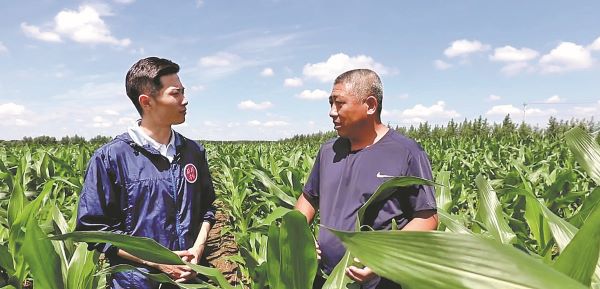
Lu Wei (right) discusses with a colleague in the field. China Daily
Lu Wei, the head of the Lu Wei Agricultural Machinery Farmers' Professional Cooperative in Jilin province, has capitalized on new technology to offer services and means to help farmers increase incomes.
The 53-year-old native of Lishu county founded the cooperative in 2011 with five other members after the growing prominence of agricultural mechanization and the issue of scattered, fragmented parcels of land contracted by individual families caught his eye.
The cooperative offers plowing, sowing, plant protection, harvesting and grain processing services and looks after 667 hectares of farmland, or roughly 90 percent of the village's total farmable area. It has grown in size to 180 members and helps a further 600 households with farming.
In 2011, Lishu began to encourage cooperatives and larger grain growers to develop large-scale operations. It later passed supporting policies and offered subsidies to growers with parcels of land 20 hectares or larger in size.
The move inspired Lu, who used to work in the transportation industry, to found the cooperative. He said that compared to traditional scattered and ridge cropping, yields under larger-scale management can increase about 1.5 percent per hectare.
"When decentralized farming becomes a large-scale operation, it creates the conditions for the use of large agricultural machinery, which can increase farming efficiency and raise incomes," Lu said.
The net income of farmers who have joined the cooperative has increased by about 20 percent compared to those who have not. People in the cooperative can concentrate on finding work outside the village, earning on average more than 20,000 yuan ($2,970) per year, he said.
Wang Xiaopeng, a villager from Lishu's Balimiao village, chose to add his 0.9 hectares of contracted land to the cooperative after struggling to manage his job outside the village.
While working in the nearby county seat, he had to leave the farm duties to his wife, who was able to handle the field until it came time for planting or harvesting, when Wang would have to ask for leave to go home and help her.
Since joining the cooperative, Wang receives about 13,000 yuan in bonuses and is able to focus on his outside job.
When the central government later issued subsidiaries for purchasing agricultural machinery, Lu bought 30 machines and received about 1.5 million yuan in subsidies in 2016.
In the past few years, the cooperative has also helped with grinding flour, pressing oil and processing grains, and a processing factory constructed last year brings in a good income for members.







